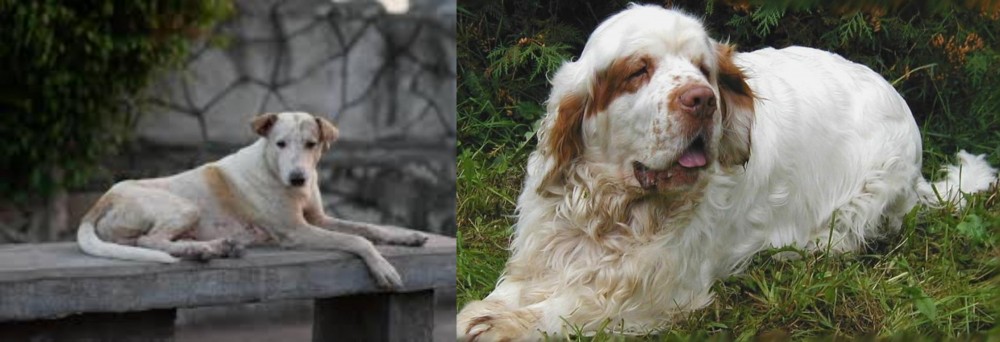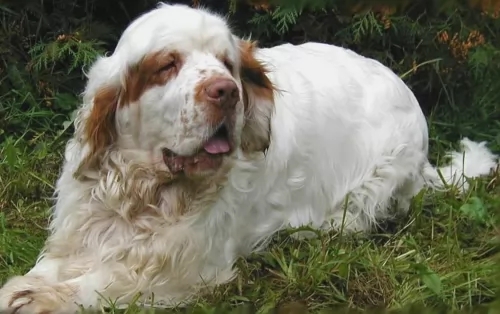 Petzlover
Petzlover Askal is originated from Philippines but Clumber Spaniel is originated from United Kingdom. Askal may grow 19 cm / 8 inches higher than Clumber Spaniel. Askal may weigh 10 kg / 22 pounds lesser than Clumber Spaniel. Askal may live 3 years more than Clumber Spaniel. Both Askal and Clumber Spaniel has almost same litter size. Askal requires Low Maintenance. But Clumber Spaniel requires High Maintenance
Askal is originated from Philippines but Clumber Spaniel is originated from United Kingdom. Askal may grow 19 cm / 8 inches higher than Clumber Spaniel. Askal may weigh 10 kg / 22 pounds lesser than Clumber Spaniel. Askal may live 3 years more than Clumber Spaniel. Both Askal and Clumber Spaniel has almost same litter size. Askal requires Low Maintenance. But Clumber Spaniel requires High Maintenance
 The Askal is a native dog of the Philippines where until fairly recently it was viewed condescendingly. As strays they have been slaughtered and dished up at the dinner table. Fortunately, campaigns have been launched to protect the dogs. The Askal has existed in the Philippines for centuries but the actual origin of the dogs is unknown. Some people speculate about the dogs, saying they look like the Dingo and must have descended from Australia’s native dog.
The Askal is a native dog of the Philippines where until fairly recently it was viewed condescendingly. As strays they have been slaughtered and dished up at the dinner table. Fortunately, campaigns have been launched to protect the dogs. The Askal has existed in the Philippines for centuries but the actual origin of the dogs is unknown. Some people speculate about the dogs, saying they look like the Dingo and must have descended from Australia’s native dog.
PAWS which is an animal Rescue and Re-homing, non-profit group encourages the use of the term Aspin for the dog as opposed to Askal and has had campaigns to promote the Aspin as a wonderful, local pet – loyal, robust and intelligent. In fact the Aspin Club has now been formed to give the dogs a club of their own and to promote the local breed.
 Ever since winning in Confirmation at Westminster Kennel Club’s annual show, the popularity of the Clumber Spaniel has increased markedly. The breed of Clumber Spaniel comes from the United Kingdom and it is the largest of all the spaniels. The breed is named for the Clumber Park where it was developed in Nottinghamshire. The Clumber Spaniel a=was designed to be a gundog or hunter in heavy weeds or cover. They have been popular with the Royal Family and were kept by King George V, King Edward VII, and Prince Albert.
Ever since winning in Confirmation at Westminster Kennel Club’s annual show, the popularity of the Clumber Spaniel has increased markedly. The breed of Clumber Spaniel comes from the United Kingdom and it is the largest of all the spaniels. The breed is named for the Clumber Park where it was developed in Nottinghamshire. The Clumber Spaniel a=was designed to be a gundog or hunter in heavy weeds or cover. They have been popular with the Royal Family and were kept by King George V, King Edward VII, and Prince Albert.
It is possible that during the French Revolution, the Duc de Noailles gave his spaniels to the Duke of Newcastle in Nottinghamshire, These spaniels, Alpine Spaniel, are extinct. At the time they were bred with Basset Hounds and Great Pyrenees.
Another line of thought has the Clumber Spaniel descending form an ancient Bleinheim Spaniel, which was used to later develop the King Charles Spaniel.
Whichever theory is true, we know that they were first bred and improved by William Mansell. They were shown in 1859 in England. They were bred almost exclusively by nobility until the mid-19th century. Then World War 1 caused all breeding to be discontinued and the number of Clumbers declined drastically, only to be redeveloped after the was by King George V.
The Cumber won Best in Show at the prestige’s Crufts 1991 Centenary Show. When the American Kennel Club recognized the Clumber Spaniel, there were only 9 other breeds officially recognized. They came to Canada in the same year of 1884. They are also recognized by the UK Kennel Club as a Vulnerable Native Breed. A Clumber bred by Doug Johnson won Best in Show at the 1996 Westminster Dog Show.
The Clumber Spaniel is a loyal, gentle soul who is not very friendly with strangers. They shed all the time and snore loudly.
 Askals make awesome companions – intelligent and loving and their status is improving.
Askals make awesome companions – intelligent and loving and their status is improving.
Askals are now being trained to be bomb and narcotics sniffing dogs and it seems as though there are talks about making the Askal the national dog of the Philippines. They’re smart enough to train and socialize if you train them with patience and kindness.
They are medium-sized, feisty dogs with fairly long thin legs with short dense coats of many different colours. With their long, pointed muzzles and good, strong teeth, their ear shapes vary too, as some have pricked ears, while others have one pricked and one floppy ear.
The Askal will make a good watch dogs and he is protective with hisr human family, getting on well with children in the home, loving their energy and games.
 The Clumber Spaniel is heavy-boned, with a very large head and a square muzzle. Of all spaniels, he is the biggest. His expressive face wears a dopey, sad look and his eyes are large, shaped like leaves. The muzzle is as large as the head and his nose is square. He has freckles on his muzzle and a deep chest. His legs are straight, and his feet are solid.
The Clumber Spaniel is heavy-boned, with a very large head and a square muzzle. Of all spaniels, he is the biggest. His expressive face wears a dopey, sad look and his eyes are large, shaped like leaves. The muzzle is as large as the head and his nose is square. He has freckles on his muzzle and a deep chest. His legs are straight, and his feet are solid.
The Clumber Spaniel gives off a dignified air and despite his expressions, he is ready to play or to work at any time.
 The Askal is an independent canine, street-smart and intelligent. He is a great pet for anyone who hasn't owned a pet before as he is low maintenance and undemanding.
The Askal is an independent canine, street-smart and intelligent. He is a great pet for anyone who hasn't owned a pet before as he is low maintenance and undemanding.
The Askal is intelligent and you won't have trouble teaching him some tricks and socializing him. He gets on well with children in the home as well as with other pets and his loyalty and devotion will ensure that he makes one hang of a companion.
He is just your 'dog next door', has no hang-ups and is simple to please. Be patient and kind to him and you'll be rewarded by having an awesome best friend.
Your Askal is wanting to be your unconditional friend through thick and thin. His undemanding, low maintenance character will mean that you won't be running to the vet with him all the time. Look after him well, include him as a member of the family and in exchange you'll have a wonderful best friend.
 Askals are healthy dogs because they are a mixed breed. The parents of a mongrel puppy have fewer genes in common than would be with a pure-bred mating. This is a distinct health advantage and mongrels are healthier and live longer than pure bred dogs. Street dogs have greater generic diversity and this gives them high resistance to many common dog illnesses.
Askals are healthy dogs because they are a mixed breed. The parents of a mongrel puppy have fewer genes in common than would be with a pure-bred mating. This is a distinct health advantage and mongrels are healthier and live longer than pure bred dogs. Street dogs have greater generic diversity and this gives them high resistance to many common dog illnesses.
The Askal is a tough, low maintenance dog that won’t cost you a lot of money in veterinary bills. Every Askal puppy will have to be taken to the vet to get his must-have vaccinations to protect him from killer dog diseases.
 The Clumber Spaniel can suffer from a variety of conditions due to its very design and genetics. Lameness early in life can be attributed to the large and fast-growing bones in the Clumber. This lameness will dissipate when the pup is fully grown. Other issues include:
The Clumber Spaniel can suffer from a variety of conditions due to its very design and genetics. Lameness early in life can be attributed to the large and fast-growing bones in the Clumber. This lameness will dissipate when the pup is fully grown. Other issues include:
Can become dehydrated and all the problems that arise from a dog being overheated and dehydrated.
Must have a caesarian section. They may also have a sensitivity to the anesthesia used in the procedure.
Hypothyroidism with ear and skin complications.
They cannot take sulfa drugs.
 the Askal is a low shedder and to keep him in tip-top condition will require you brushing his shor-haired coat twice a week.
the Askal is a low shedder and to keep him in tip-top condition will require you brushing his shor-haired coat twice a week.
Askals dogs are native Philippine dogs and aren’t difficult to feed. While you want to give your Askal the best quality food possible, they are unlike pure breed pedigrees and their stomachs are far more resilient to disease causing organisms that may upset the stomach. Having such a robust dog as a pet will cost you less in dog food as they can tolerate cheaper quality foods and left over scraps from the family table. Make sure the food you toss to him is fresh as you don’t want to take his strong stomach for granted and risk him getting sick. If you’re able to provide your Askal with hone cooked food, rice, vegetables and meat will be perfect for this wonderful pet of yours. Feeding your Askal will depend on your budget, but that’s the beauty with the Askal – it’s a dog that every dog-lover can own because this isn’t an exotic, expensive dog. Make sure he always has access to a bowl of clean, cool water.
The Askal has always roamed the Phillipine streets. Every dog will require some form of exercising and the Askal is no different. Take him for walks or play ball games with him to ensure he is stimulated and made to feel part of the family.
 The Clumber has a tendency to gain weight and become obese. Feed them wisely. Feed about ¼ to ½ of a cup of high quality dry dog food twice a day.
The Clumber has a tendency to gain weight and become obese. Feed them wisely. Feed about ¼ to ½ of a cup of high quality dry dog food twice a day.
This can be cervical or spinal. The discs can be bulging or ruptured. Can lead to paralysis if not treated properly.
Entropion with inward rolling of eyelid or Ectropion with outward rolling of eyelid.
The Clumber Spaniel is not the most energetic of canines. He still needs moderate exercise daily but don’t overdo it. Walks, fetch, swimming, chase or confirmation are good activities for a Clumber.